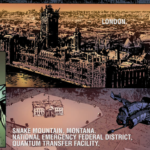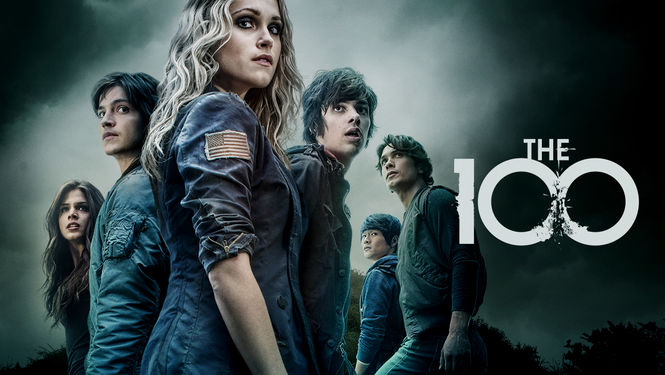
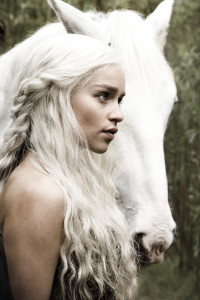 Season 6 of Game of Thrones is nearly upon us. Since its HBO debut, it’s been adored by fans and equally scorned, usually when it comes to the portrayal of women in the show, sexuality and sexual abuse. In the six years that it’s been airing, countless women have been assaulted, mutilated and abused for the sake of entertainment. Virtually none of it furthers the plot and as such, it rightfully upsets viewers. There are some episodes that feel like they go out of the way to show violence against women. It’s gotten to a point where sites like The Mary Sue have put a ban on Game of Thrones coverage in protest.
Season 6 of Game of Thrones is nearly upon us. Since its HBO debut, it’s been adored by fans and equally scorned, usually when it comes to the portrayal of women in the show, sexuality and sexual abuse. In the six years that it’s been airing, countless women have been assaulted, mutilated and abused for the sake of entertainment. Virtually none of it furthers the plot and as such, it rightfully upsets viewers. There are some episodes that feel like they go out of the way to show violence against women. It’s gotten to a point where sites like The Mary Sue have put a ban on Game of Thrones coverage in protest.
Outside of the mommy issues that many of the Game of Thrones writers seem to be working out, the show is a beautiful and heartbreaking fantasy epic that I can’t seem to quit. It genuinely puts you on edge, largely due to the fact that we’ve been taught that no character is safe. Here’s a joke for you:
Why isn’t George R.R. Martin on Twitter?
Cause he killed all 140 characters!
This joke was funnier when the only social media that George R.R. Martin used was LiveJournal. The idea behind it remains: no character is sacred.
Recently I started watching the TV series, The 100 from The CW. Like Game of Thrones, it was adapted from a book trilogy, written by Kass Morgan. If you aren’t familiar, the story follows the last of humanity, struggling to survive in space after Earth is wiped out by nuclear war. Their vessel in space is no longer a viable option for them after three generations so they send a group of 100 juvenile delinquents down to Earth to see if it’s survivable. From there, we mostly follow the kids as they try to survive in a world that has become even more dangerous and frightening.
The CW has been known for bringing us young adult shows for years. Everything from The OC to One Tree Hill to The Vampire Diaries to The Flash, Arrow, and Legends of Tomorrow. While all of these shows have had memorable female characters, they completely pale in comparison to The 100.
I have never seen female characters presented like the characters in The 100. The women of this show do not exist to further the plot lines of the men. They do not fall into cliché character types that have been done a thousand (or 100, WINKY FACE) times before. Theh women in this show do not perpetuate stereotypes. These women are placed in a wide variety of roles where they are directly and respectively responsible for saving the human race.
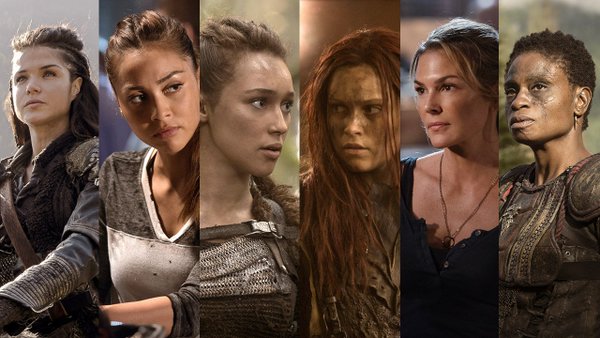
Many YA shows fit into a “guilty pleasure” category for me because I enjoy the content but I can’t always appreciate the writing, the characters or the decisions that the characters make. You’re constantly yelling at the TV and trying to reconcile why these characters would make the choices that they’re making. And yet this is another thing that sets The 100 apart from other shows. Characters make tough decisions to coincide with the tough world that they live in. But the important distinction here is that they’re tough decisions, not stupid ones.
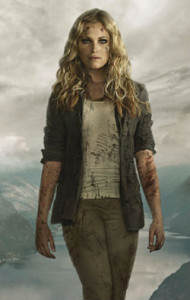 The character of Clarke Griffin takes it upon herself to be the leader of her people and to bear the burdens of doing what needs to be done. She does not lead her people with a soft heart but with the heart of a person born to make decisions and bring positive change with that leadership, even at the cost of her soul. Clarke is haunted by her decisions but knows they are right and doesn’t stray from the path that she’s set her people on to sleep better at night.
The character of Clarke Griffin takes it upon herself to be the leader of her people and to bear the burdens of doing what needs to be done. She does not lead her people with a soft heart but with the heart of a person born to make decisions and bring positive change with that leadership, even at the cost of her soul. Clarke is haunted by her decisions but knows they are right and doesn’t stray from the path that she’s set her people on to sleep better at night.
This brings me back around to what I was saying about Game of Thrones. The 100 runs its show in the same “no one is off-limits” way, except when it comes to sexual abuse.
You have to believe that in a wasteland of a world where humanity is running wild that rape and abuse are probably still prevalent, but you could believe that it wasn’t actually a plague on womanhood based on the respectful nature of the show where we’re not forced to watch our favourite characters get violated time and time again. The only sex that is shown in The 100 is of the consenual variety and in most instances (that I can think of), is actually instigated by the women. So not only do we get exposed to healthy sexual relationships, we see women owning their sexuality and being treated in the best possible way.
The writers behind Game of Thrones have justified the sexual abuse by saying it’s a ruthless medieval world where that sort of abuse happens. There is no justification of that though. If you’re the worldbuilder, you can choose to portray a society filled with men who know better or, at the very least, not constantly remind us how incredibly unsafe the world (even fictional ones) is for women.
The 100 addresses many different types of diversity with a wide variety of actors and actresses of mixed ethnicities. On top of that, there are queer characters and relationships featured with central characters. I’m aware, despite not personally being caught up, that a very questionable decision was made regarding the fate of one such character. As I’m not caught up, I can’t speak to that directly but from what I know, The 100, despite this, has still treated its female characters with a plethora of more respect than in five seasons of Game of Thrones. Does that make the choice by the writers any less awful? Absolutely not. However, for the sake of this comparison, we’ll move on.

While Game of Thrones and The 100 have different subject matter that they show, there are still many similarities between the two that future television writers can learn from. The 100 recently made a very upsetting choice that has started a movement amongst fans but that’s not their norm, whereas Game of Thrones has been upsetting its viewers since 2011. An overall quality exists for both shows but there are lessons to be learned and one of the most important ones is giving women great roles and treating them like the incredibly women that they are.

